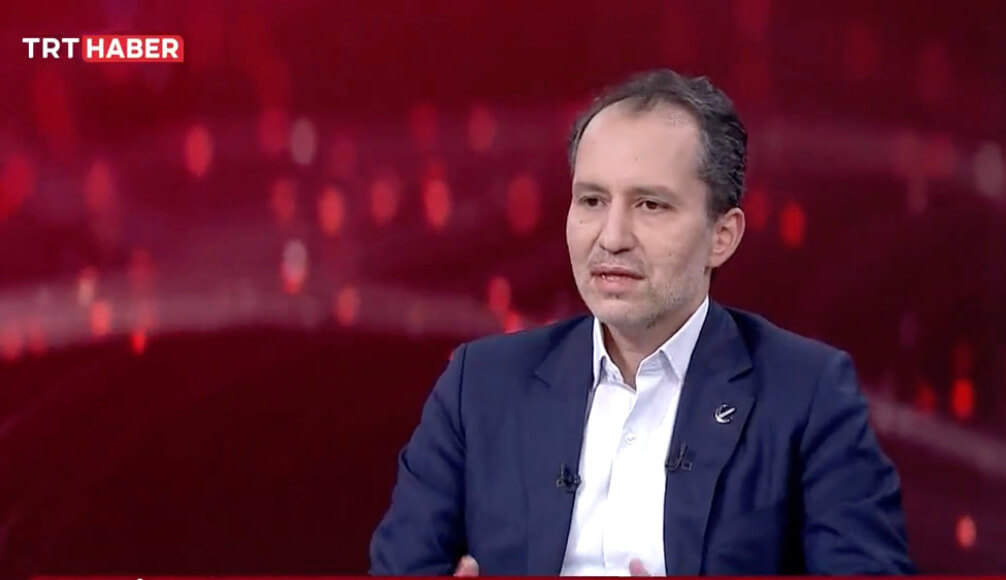Fatih Erbakan, leader of the Islamist New Welfare Party (YRP), slammed Turkish President Recep Tayyip Erdoğan over a shipment of boron from Turkey to Israel by a company owned by the Turkey Wealth Fund (TWF), which is run by the president.
“A document has surfaced showing that ETİ Maden, a Turkey Wealth Fund company that reports directly to the president, exported 21 tons of boron in the form of boric acid to Israel just a week before the elections. As the New Welfare Party, we once again call on the authorities to rid themselves of this great sin IMMEDIATELY!” Erbakan tweeted, sharing a bill published by investigative journalist Metin Cihan on Wednesday.
Doğrudan Sayın Cumhurbaşkanı’na bağlı olan Türkiye Varlık Fonu’nun şirketlerinden ETİ Maden’in, seçimlerden bir hafta önce İsrail'e 21 ton borik asit formunda bor madeni ihracatı yaptığına dair bir belge ortaya çıktı. Yeniden Refah Partisi olarak yetkililere bir kez daha çağrıda… pic.twitter.com/twyxZ4Isoi
— Dr. Fatih Erbakan (@ErbakanFatih) April 4, 2024
The shipment, along with significant shipments of other goods from Turkey to Israel, is taking place despite Erdoğan’s harsh criticism of Israel’s military operations in Gaza.
Israel began pounding Gaza in the aftermath of an unprecedented attack by Hamas militants on October 7, which killed around 1,200 people in Israel. The death toll in Gaza stands at over 33,037, according to the Gaza Health Ministry.
According to the bill shared by Cihan on X, Eti Maden, a company wholly owned by the TWF, sold boron in the form of boric acid to Fertilizers & Chemicals Ltd, a large Israeli chemical company known for supplying the Israeli military.
This transaction stands in stark contrast to the Turkish government’s verbal condemnations of Israeli military actions in Gaza and its stated support for the Palestinian cause.
This revelation comes at a time when Turkey’s stance towards Israel is under scrutiny due to a perceived contradiction between genocide allegations and the government and private companies doing business with the country as usual.
Supporters of Erdoğan and members of the government defend Turkey’s ongoing trade with Israel on the grounds that it is conducted by private companies and that government intervention would upset the markets, hurting Turkey more than Israel.
However, Cihan’s revelations now show that the trade is not only conducted by private companies but also by a company directly controlled by Erdoğan through the TWF.
The trade between Turkey and Israel, which is partly run by individuals close to Erdoğan despite his anti-Israel rhetoric, was first uncovered by investigative journalist Cihan at the end of November. Since then, Cihan has been reporting on trade between the two countries based on publicly available sources.
The ongoing conflict and Erdoğan’s condemnation notwithstanding, Israel remains an important trading partner for Turkey, ranking 13th on Turkey’s export list in 2023. Trade between the two countries amounted to $5.42 billion last year and accounted for 2.1 percent of Turkey’s total exports, a decrease from $7 billion in 2022.
Observers say Cihan’s revelations about the Justice and Development Party’s (AKP) hypocrisy over Gaza were used as a weapon by the opposition parties in the run-up to Sunday’s local elections and are one of the reasons for the rise of the Islamist YRP, which won nearly 6 percent of the vote and 60 municipalities, becoming the third strongest political party by vote share.
Erdoğan’s AKP was relegated to second place behind the largest opposition party, the Republican People’s Party, in a historic first on Sunday, coming as a shock to the 70-year-old ruler.
The YRP, which allied with Erdoğan’s AKP in the May elections but later parted ways with it and fielded its own candidates for Sunday’s elections, turned out to be the third most successful party in the local polls.
The YRP, established in 2018 by Fatih Erbakan, the son of legendary Islamist prime minister and leader of the Welfare Party (RP) Necmettin Erbakan, took part in Erdoğan’s Public Alliance, comprising the far-right MHP and several small parties, in the May general election. The YRP was able to gain five seats in parliament as it won 2.8 percent of the nationwide vote at the time, which amounted to 1.5 million votes.
On Sunday, the YRP managed to get 6.1 percent of the nationwide vote, or 2.8 million votes.
Many say the YRP’s anti-Israel rhetoric and its criticism of the AKP government’s ongoing trade with Israel despite its war on Gaza have prompted Turkey’s Islamist and conservative voters to see the YRP as an alternative to the AKP.
Several days before the elections, YRP leader Fatih Erbakan laid out conditions to the AKP in return for him withdrawing his party’s candidate from the İstanbul election. He called on the AKP government to cut off trade with Israel, to close down the Kürecik Radar Station in eastern Turkey, established in 2012 for use by NATO as an early-warning radar against ballistic missile attacks, which he said is used to protect Israel, and to raise pensions to a minimum of TL 20,000 ($616).
The AKP ignored the YRP’s demands.


